I love to read. By God’s grace I am a pretty fast reader; I usually read a couple books each week. I find it helpful to summarize my thoughts on each book and I offer those thoughts in the hope that you will be encouraged to either read or pass over the given title.
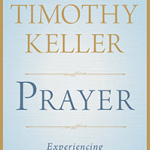 Prayer: Experience Awe and Intimacy with God by Tim Keller. The Manhattan Man once said, “If you wait to write until you are older, the writing will go much faster, because you will have reams of material and many layers of thought about a lot of subjects and texts. Writing a book in your 50s will go twice as fast and be twice as good as if you try the same book in your 30s. It’s just good stewardship to wait.” Keller has modeled his own wisdom and his books are always the “twice as good” for it. He published Ministries of Mercy in the late 80s and waited twenty years to publish a second book. Now, the man is a machine, annually churning out substantial volume. And the Keller machine just produced one of the best books on prayer you can read.
Prayer: Experience Awe and Intimacy with God by Tim Keller. The Manhattan Man once said, “If you wait to write until you are older, the writing will go much faster, because you will have reams of material and many layers of thought about a lot of subjects and texts. Writing a book in your 50s will go twice as fast and be twice as good as if you try the same book in your 30s. It’s just good stewardship to wait.” Keller has modeled his own wisdom and his books are always the “twice as good” for it. He published Ministries of Mercy in the late 80s and waited twenty years to publish a second book. Now, the man is a machine, annually churning out substantial volume. And the Keller machine just produced one of the best books on prayer you can read.
Based on early reviews and commendations my expectations for Prayer were sky high. I was a bit fearful that my hopes were unrealistic and would inevitably be somewhat dashed. But, God be praised, I wasn’t even close to being disappointed. Keller has done something almost magical in this book as he manages to strike all the right balances on the timeless subject at hand. He is forcefully clear about the duty of prayer, joyfully winsome about the privilege of prayer, reverently affectionate about the awe-filled experience of prayer, and immanently useful on the daily practice of prayer. The work abounds with piercing insights from Keller and all the saints of old upon which he calls. One needs only to read the chapter on praising God in prayer to see how Keller enlivens a most basic – and often assumed – aspect of communion with God. This may just be the best book I’ve read all year.
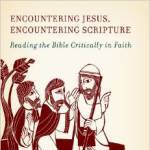 Encountering Jesus, Encountering Scripture: Reading the Bible Critically in Faith by David Crump. David Crump, a professor in the Religion Department of Calvin College, has a simple purpose in this volume: “My goal in this book is to secure thorough integration of heart, mind, and soul by keeping first things first. . . . the basic issues in this arena are epistemological and spiritual. How can a person come to know God?” While that purposeful question has universal application, Crump’s volume is almost exclusively aimed at scholars wrestling with the implications of higher criticism. Crump wants Christians scholars to see that they don’t need to surrender intellectual curiosity or critical thinking in study, but they must “perceive and evaluate academic subjectivity in light of the subjectivity of faith.” A deep affinity for Kierkegaardian existentialism, sympathies for the New Perspective on Paul, catering to higher criticism of the gospel narratives, and a near absence of focus on the Spirit’s role in faith make this a curious book. For I agree with his destination – faith must govern our academic study, not the other way around – but I find those winding roads on which he travels are ones I would not trod.
Encountering Jesus, Encountering Scripture: Reading the Bible Critically in Faith by David Crump. David Crump, a professor in the Religion Department of Calvin College, has a simple purpose in this volume: “My goal in this book is to secure thorough integration of heart, mind, and soul by keeping first things first. . . . the basic issues in this arena are epistemological and spiritual. How can a person come to know God?” While that purposeful question has universal application, Crump’s volume is almost exclusively aimed at scholars wrestling with the implications of higher criticism. Crump wants Christians scholars to see that they don’t need to surrender intellectual curiosity or critical thinking in study, but they must “perceive and evaluate academic subjectivity in light of the subjectivity of faith.” A deep affinity for Kierkegaardian existentialism, sympathies for the New Perspective on Paul, catering to higher criticism of the gospel narratives, and a near absence of focus on the Spirit’s role in faith make this a curious book. For I agree with his destination – faith must govern our academic study, not the other way around – but I find those winding roads on which he travels are ones I would not trod.
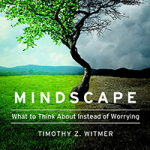 Mindscape: What to Think About Instead of Worrying by Tim Witmer. David Powlison says there are three problems “so characteristic of human nature, and come in so many variants, that if we learn to face them in our own lives and in the lives of others, we will cover the majority of ministry needs.” Those three problems are: anxiety, anger, and escapism. You don’t have to minister to others very long before you see how wise Powlison is on this point. In my church, anxiety is one of the most prevalent “respectable sins.” Tim Witmer’s Mindscape aims to answer the issue of worry a simple two-fold structure: 1) briefly outline the problem of worry, and 2) show how Philippians 4:8 provides a new “operating system” for the mind. The reader is wisely exhorted to put the mind’s attention on “whatever is true, whatever is noble, whatever is right, whatever is pure, whatever is lovely, whatever is admirable—if anything is excellent or praiseworthy—think about such things.” I wish Witmer gave a more sustained diagnosis of the spiritual roots undergirding worry, and the book could – and probably should – be significantly shorter (the content often feels redundant). Nevertheless, this is one worth meditative reading for anyone who struggles to slay the sin of worry.
Mindscape: What to Think About Instead of Worrying by Tim Witmer. David Powlison says there are three problems “so characteristic of human nature, and come in so many variants, that if we learn to face them in our own lives and in the lives of others, we will cover the majority of ministry needs.” Those three problems are: anxiety, anger, and escapism. You don’t have to minister to others very long before you see how wise Powlison is on this point. In my church, anxiety is one of the most prevalent “respectable sins.” Tim Witmer’s Mindscape aims to answer the issue of worry a simple two-fold structure: 1) briefly outline the problem of worry, and 2) show how Philippians 4:8 provides a new “operating system” for the mind. The reader is wisely exhorted to put the mind’s attention on “whatever is true, whatever is noble, whatever is right, whatever is pure, whatever is lovely, whatever is admirable—if anything is excellent or praiseworthy—think about such things.” I wish Witmer gave a more sustained diagnosis of the spiritual roots undergirding worry, and the book could – and probably should – be significantly shorter (the content often feels redundant). Nevertheless, this is one worth meditative reading for anyone who struggles to slay the sin of worry.
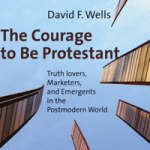 The Courage to Be Protestant: Truth-lovers, Marketers, and Emergents in the Postmodern World by David Wells. For over fifteen years Wells was occupied with a publishing project deconstructing western evangelicalism. Al Mohler called Wells’ No Place for Truth (1993) “the bomb that exploded on the evangelical playground.” That book was followed by God in the Wasteland (1994), Losing Our Virtue (1998), and Above All Earthly Powers (2005). Running through these winsome, yet devastating, critiques were five main doctrinal themes: truth, God, self, Christ, and the church. Published in 2008, The Courage to Be Protestant represents Wells’ attempt to summarize the previous four works and their main doctrinal themes. Therefore, anyone familiar with Wells and his evangelical critique won’t find anything new, just a fresh recapturing of his sobering assessment. If you haven’t encountered Well before this may just be the best place to start.
The Courage to Be Protestant: Truth-lovers, Marketers, and Emergents in the Postmodern World by David Wells. For over fifteen years Wells was occupied with a publishing project deconstructing western evangelicalism. Al Mohler called Wells’ No Place for Truth (1993) “the bomb that exploded on the evangelical playground.” That book was followed by God in the Wasteland (1994), Losing Our Virtue (1998), and Above All Earthly Powers (2005). Running through these winsome, yet devastating, critiques were five main doctrinal themes: truth, God, self, Christ, and the church. Published in 2008, The Courage to Be Protestant represents Wells’ attempt to summarize the previous four works and their main doctrinal themes. Therefore, anyone familiar with Wells and his evangelical critique won’t find anything new, just a fresh recapturing of his sobering assessment. If you haven’t encountered Well before this may just be the best place to start.
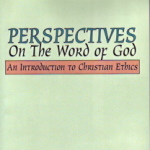 Perspectives on the Word of God: An Introduction to Christian Ethics by John Frame. In 1988 Trinity Evangelical Divinity School invited John Frame to deliver that year’s Kenneth Kantzer Lectures. The previous year saw Frame publish The Doctrine of the Knowledge of God, the first volume in his Theology of Lordship Series. Frame’s three Kantzer lectures presented a few main theses from the eventual Lordship volumes on The Doctrine of the Word of God and The Doctrine of the Christian Life. So Perspectives functions as something like super-short study guide on Frame’s theological method (tri-perspectivalism) and how he applies it to the word of God and ethics. If you’ve ever wanted a quick introduction to Frame’s love of triads this is a good place to start.
Perspectives on the Word of God: An Introduction to Christian Ethics by John Frame. In 1988 Trinity Evangelical Divinity School invited John Frame to deliver that year’s Kenneth Kantzer Lectures. The previous year saw Frame publish The Doctrine of the Knowledge of God, the first volume in his Theology of Lordship Series. Frame’s three Kantzer lectures presented a few main theses from the eventual Lordship volumes on The Doctrine of the Word of God and The Doctrine of the Christian Life. So Perspectives functions as something like super-short study guide on Frame’s theological method (tri-perspectivalism) and how he applies it to the word of God and ethics. If you’ve ever wanted a quick introduction to Frame’s love of triads this is a good place to start.
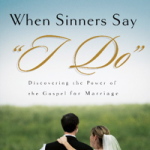 When Sinners Say “I Do”: Discovering the Power of the Gospel for Marriage by Dave Harvey. My wife and I just wrapped up premarital counseling with a young couple in our church and When Sinners Say “I Do” was a small part of our weekly discussion. Harvey does a good job applying the gospel to all matters of marriage, but he often spends the majority of each chapter in telling stories and anecdotes. So I wonder if the book wouldn’t be served by cutting some of those in order to more clearly amplify the rich biblical teaching he offers. His final chapter (“When Sinners Say Goodbye”) on marriage in light of eternity is superb. All in all, When Sinners Say “I Do” is a solid resource to make available in your church.
When Sinners Say “I Do”: Discovering the Power of the Gospel for Marriage by Dave Harvey. My wife and I just wrapped up premarital counseling with a young couple in our church and When Sinners Say “I Do” was a small part of our weekly discussion. Harvey does a good job applying the gospel to all matters of marriage, but he often spends the majority of each chapter in telling stories and anecdotes. So I wonder if the book wouldn’t be served by cutting some of those in order to more clearly amplify the rich biblical teaching he offers. His final chapter (“When Sinners Say Goodbye”) on marriage in light of eternity is superb. All in all, When Sinners Say “I Do” is a solid resource to make available in your church.
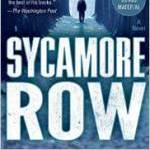 Sycamore Row by John Grisham. The first “grown up” author I read as a young teenager was John Grisham. His southern-set legal thrillers filled many late night moments. In time I moved on to other authors and genres, but Grisham has always maintained something of a sentimental place in my heart. When I heard one of his recent novels was a sequel to the blockbuster A Time to Kill I knew it was time to return to Ford County, Mississippi after an absence of almost two decades. Set three years after the Carl Lee Hailey trial, Sycamore Row finds lawyer Jake Brigance caught up in another tense, racially-charged trial. This one isn’t about murder, but Jake’s probation of a holographic will written by a rich local citizen named Seth Hubbard. Just before he committed suicide Hubbard sent Jake the will and left 90% of his estate to his black housekeeper. The ensuing thrills are somewhat predictable, but oh so satisfying.
Sycamore Row by John Grisham. The first “grown up” author I read as a young teenager was John Grisham. His southern-set legal thrillers filled many late night moments. In time I moved on to other authors and genres, but Grisham has always maintained something of a sentimental place in my heart. When I heard one of his recent novels was a sequel to the blockbuster A Time to Kill I knew it was time to return to Ford County, Mississippi after an absence of almost two decades. Set three years after the Carl Lee Hailey trial, Sycamore Row finds lawyer Jake Brigance caught up in another tense, racially-charged trial. This one isn’t about murder, but Jake’s probation of a holographic will written by a rich local citizen named Seth Hubbard. Just before he committed suicide Hubbard sent Jake the will and left 90% of his estate to his black housekeeper. The ensuing thrills are somewhat predictable, but oh so satisfying.
Click here to find other entries in the Recent Reads series.
